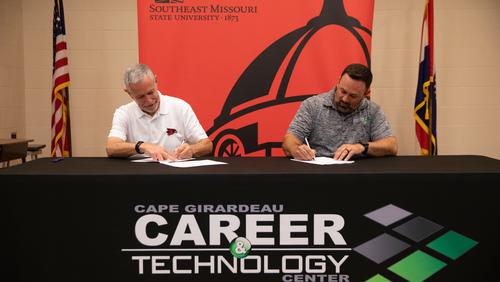Southeast Missouri State University and the Cape Girardeau Career and Technology Center (CTC) signed an agreement today to collaborate in offering a bachelor’s degree in respiratory therapy beginning fall 2023.
The CTC offers a respiratory therapy certificate program that is accredited by the Commission on Accreditation for Respiratory Care. However, upcoming changes to accreditation and education levels will require respiratory therapists to have a bachelor’s degree.
“We are very pleased to partner with the CTC,” said Dr. Carlos Vargas, president of Southeast Missouri State. “Southeast has very strong programs in allied health, nursing, and pre-professional programs, and the CTC has an established and successful certificate program. The partnership will allow the program to seamlessly transition to a Bachelor of Science program giving students more career opportunities.”
 Brock Crowley, director of the Cape Girardeau Career and Technology Center, said the CTC started formulating a plan immediately after learning about changes to the level of education required.
Brock Crowley, director of the Cape Girardeau Career and Technology Center, said the CTC started formulating a plan immediately after learning about changes to the level of education required.
“Southeast Missouri State University has a strong reputation for producing high quality healthcare professionals and was the obvious choice for a partnership,” Crowley said. “We are extremely excited to partner with SEMO as they have been nothing short of amazing to work with and get this new phase of the respiratory therapy program up and going. It is our hope this partnership will enable more students to be exposed to respiratory therapy (RT) and create opportunities to fulfill needs for RTs in the local healthcare community.”
The CTC will continue to teach 69 credit hours of the technical aspects of the program with Southeast offering 51 hours of state general education requirements as well as additional biology and chemistry courses.
The job outlook for respiratory therapists is growing. According to the Bureau of Labor Statistics, the need was exacerbated during the pandemic and jobs are expected to grow 23% through 2030. According to faculty at the CTC, they’ve seen starting salaries almost double post-COVID.
Crowley said the CTC’s respiratory therapy students have always been highly sought-after due to the rigorous training required in the program.
“Students won’t be doing anything after they graduate that they haven’t done before,” he said.
Vargas agreed that was part of the appeal in partnering.
“At Southeast, our programs are designed so students have experience doing the job before they get the job, and the CTC has built a very hands-on program. Students are in facilities getting experience their first semester,” said Vargas. “We look forward to this collaboration to prepare students for this high demand field and to ensure they are ready to succeed in Tomorrow’s Careers Today.”
“We are very pleased to partner with the CTC,” said Dr. Carlos Vargas, president of Southeast Missouri State. “Southeast has very strong programs in allied health, nursing, and pre-professional programs, and the CTC has an established and successful certificate program. The partnership will allow the program to seamlessly transition to a Bachelor of Science program giving students more career opportunities.”
 Brock Crowley, director of the Cape Girardeau Career and Technology Center, said the CTC started formulating a plan immediately after learning about changes to the level of education required.
Brock Crowley, director of the Cape Girardeau Career and Technology Center, said the CTC started formulating a plan immediately after learning about changes to the level of education required.“Southeast Missouri State University has a strong reputation for producing high quality healthcare professionals and was the obvious choice for a partnership,” Crowley said. “We are extremely excited to partner with SEMO as they have been nothing short of amazing to work with and get this new phase of the respiratory therapy program up and going. It is our hope this partnership will enable more students to be exposed to respiratory therapy (RT) and create opportunities to fulfill needs for RTs in the local healthcare community.”
The CTC will continue to teach 69 credit hours of the technical aspects of the program with Southeast offering 51 hours of state general education requirements as well as additional biology and chemistry courses.
The job outlook for respiratory therapists is growing. According to the Bureau of Labor Statistics, the need was exacerbated during the pandemic and jobs are expected to grow 23% through 2030. According to faculty at the CTC, they’ve seen starting salaries almost double post-COVID.
Crowley said the CTC’s respiratory therapy students have always been highly sought-after due to the rigorous training required in the program.
“Students won’t be doing anything after they graduate that they haven’t done before,” he said.
Vargas agreed that was part of the appeal in partnering.
“At Southeast, our programs are designed so students have experience doing the job before they get the job, and the CTC has built a very hands-on program. Students are in facilities getting experience their first semester,” said Vargas. “We look forward to this collaboration to prepare students for this high demand field and to ensure they are ready to succeed in Tomorrow’s Careers Today.”